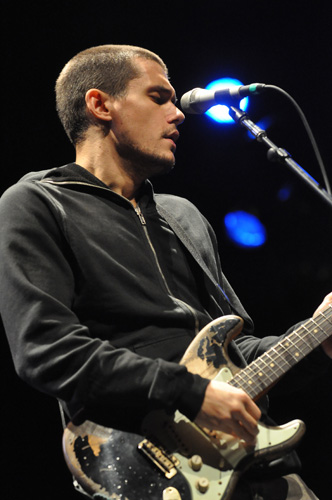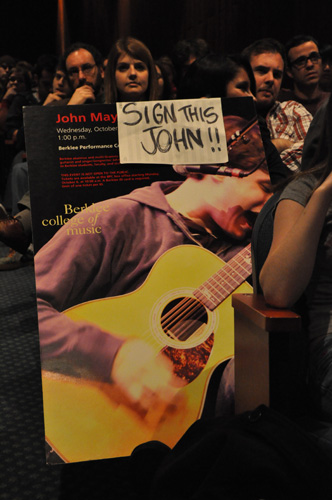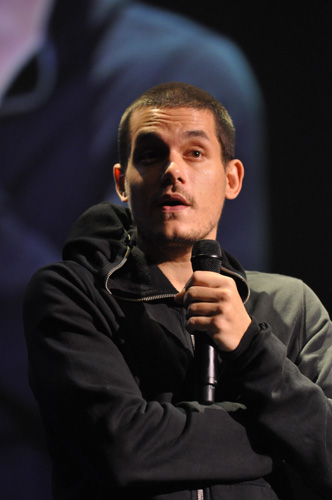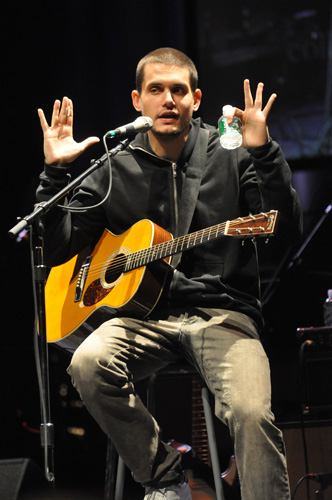John Mayer: Converting Information to Inspiration

John Mayer performs at a Berklee Performance Center clinic.
Photo by Phil Farnsworth

Mayer jams with Guitar Department assistant professor Tomo Fujita.
Photo by Phil Farnsworth

The line for Mayer's clinic wraps around the BPC and down Boylston and Cambria streets.
Photo by Phil Farnsworth

One member of the packed audience tries to get Mayer's attention.
Photo by Phil Farnsworth

Mayer doles out advice.
Photo by Phil Farnsworth

Mayer alternates between performing songs and sharing words of wisdom.
Photo by Phil Farnsworth

Mayer greets the crowd at the BPC.
Photo by Phil Farnsworth

Mayer autographs a fan's guitar.
Photo by Phil Farnsworth
More than a decade ago, John Mayer came to Berklee as a guitar player. After a musical epiphany of sorts, he emerged as a singer/songwriter guitar player two semesters later. Shortly thereafter, he made it big, and continues to stay at the top of his game. While visiting his alma mater to share his gift for the craft, he gave a generous two-plus hour clinic for a packed audience at the Berklee Performance Center. He interspersed a mini-concert—playing "Stop This Train," "Waiting on the World to Change," "Who Did You Think I Was," "Gravity," and an unfinished song, and jamming some blues with assistant professor of guitar Tomo Fujita—between handing out nuggets of advice for aspiring musicians. From the necessary compromises of a musician to breaking out of the "sensitive songwriter guy" mold, Mayer '98 connected on many different levels. Here is a condensed and edited sampling of what he had to say:
Being listenable:
"The fall of '97 and the spring of '98 were two very different semesters. The first semester, I wanted to be the best guitar player I could possibly be. . . . But I never felt like I connected with anything or anybody because I just wanted to be the best. It was an expectation that was so broad that it was indefinable and therefore, unreachable. I went home for Christmas break and questioned everything. I went back to the pop side of things . . . to Radiohead's OK Computer, Erykah Badu: Live, Ben Folds Five. I thought, this is what I want to do. I want to be listenable."
Coming into songwriting:
"The first era of my songwriting began January and February of my second semester. I can't say I went to class as much as I should have. There was something happening. There was this definition of myself, of my identity. All of a sudden, I found this perfect balance for Berklee. Here's the information coming in, here's the inspiration going out. And this is the title of my clinic. I want to call it 'Inspiration/Information.' It is the perfect way to delineate how Berklee is right, how Berklee can work. Your hardest job here is to convert that information into your inspiration."
Defining expectations:
"The number one thing you have to do before you set out on any other goal or any other course is to define your expectations—on the outset of every single project, record, tour. Everyone in this room wants to make it but I question how you would recognize making it. What is making it? What do you want to be? Who here wants a record deal? What does a record deal look like? Do you want to sell a million copies, two million copies?"
Getting pigeonholed, for better or for worse:
"I thought, that's just this little song ['Daughters'] that lives on the record, track eight or track nine, one you discover three months in. I thought, I'd rather not have a hit with this song because [it] was going to peg me forever as sensitive songwriter guy. . . . It leaked. But how upset can I be because it won [a Grammy Award for] Song of the Year that year. Something else was at stake, though, which was my identity. I thought, I need to find a different pursuit musically so I can shake it all up. I started the John Mayer Trio. Because of that exploration, I was able to come back in the studio and learn fully to take the guitar and writing side and put them together the best I've ever done so far."
On magic moments:
"'Stop this Train' was a magic moment for me. I was in between homes and living in a hotel room. I had double kidney stones at the same time. I had nothing to do but medicate, get CAT scans, and hang out in the hotel room. That gave me a whole bunch of time to sit and play guitar and look out the window. There is something to be said about solitary confinement, or as I say, solitary refinement. That's what this trip [to Berklee] is for me, too. Selfishly, I needed this, as well, to get back to the basics, get back inside."
The greatest drug:
"I used to love writing a song and going out to dinner. . . . That is the greatest feeling in the world. Taking a walk because you know you have a song and you're going to come back after dinner and finish that bridge. It's a better drug than anything I've ever heard of in my life. That is the high of all life. You've created something for free that will give you identity and purpose and the feeling of being awake in every way. And it will happen. But in the meantime, get the house ready for it."
When to compromise a song:
"You do compromise your art for success. When people say, 'You go in that office and you don't compromise a thing,' you're going to walk out with nothing. Really what they mean to say is, 'Don't compromise the things you can't live without.' You learn to compromise that which you can give away and defend that which you can't."
